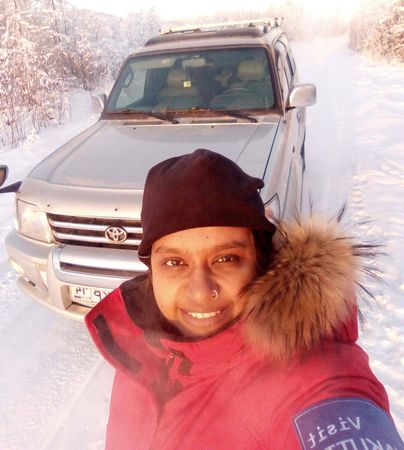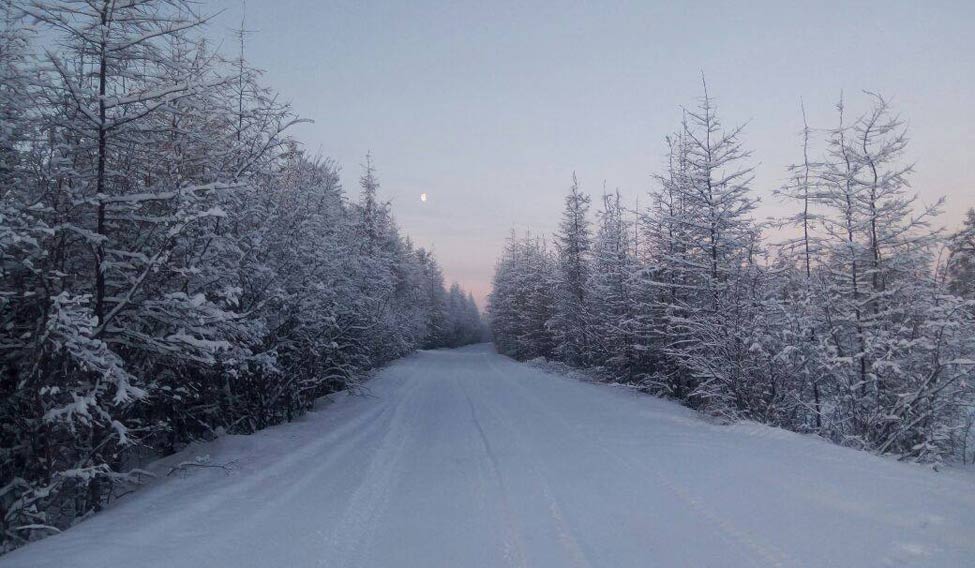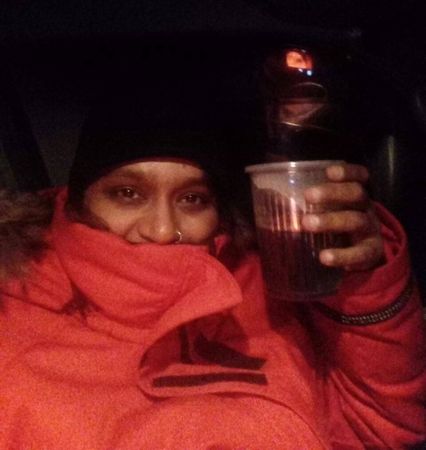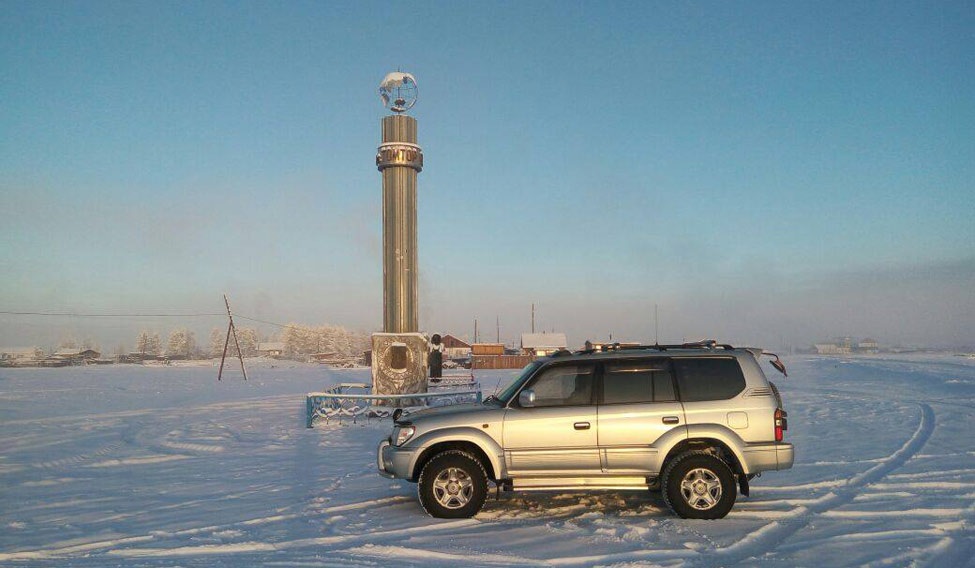For Nidhi Tiwari, just back from her 5,000-km solo road trip to the 'pole of cold' in Siberia, there is immense satisfaction in having completed the extreme challenge. But, equally satisfying has been the response she has had from schoolchildren who were part of her journey through the digital platform. Outdoor learning has been a major thrust of the journey.
Long stretches of white, icy and desolate roads, getting lost on them, treading carefully on frozen rivers, the mind-blowing colours of the Siberian landscape and the lives of the people were brought live to the partner schools using updates, videos and photos. The students got to interact with Nidhi during the 13-day journey and more elaborately when she visited the schools after her journey.

The impact on young minds was clearly visible during her interaction. If students of Emerald Heights, Indore, the partner school for the Siberian expedition, quizzed her about the idea of not giving up and where it stems from, at Sri Kumaran Children's Home in Bengaluru—her alma mater—discussions on the journey ranged from history, politics, sociocultural leanings and more. At many of the schools, Nidhi was happy to hear students saying that her journey made them realise "we are capable of doing more than what we think".
Many of them followed the journey on Facebook and have become her Facebook friends. All discussions are centred around what it takes to do stuff out of the ordinary, says Nidhi, who is happy that youngsters are thinking on those lines.
So, what was the trip about and who is this woman who boldly went where few had dared to go?
For Nidhi, the label of woman is just that—a label. This young woman and mother of two would rather be known for her skills, strengths and potential as a person. This trip comes as further proof of her mettle.
Facing temperatures nearing minus 60 deg C, desolate ice-covered roads laid on permafrost, a diet mainly consisting of raw horse and caribou meat and a strange dialect, Nidhi couldn't have asked for more extreme an adventure.
The trip saw her drive the Toyota Land Cruiser from Yakutsk to Magadan and back. It took her on the infamous Kolyma highway, known as the 'Highway of bones', after the buried skeletons of labourers who died during the construction. Nidhi also made it to Oymyakon, the pole of cold or the coldest inhabited place on the earth. A first for an Indian.
The terrain and ice-laid roads meant a lot of stressful driving because of the constant concentration it called for. The low speeds made it more frustrating, she says.
The roads, too, posed problems at times. Highways were rare. Mostly they were ice roads to soft snow to sheet-like ice on road with small snow on top. Climbing or getting down some of these on the old Kolyma road was challenging. To drive on ice, the braking, she notes, has to be deliberate and planned, to avoid skidding. You also need good steering control.
Many of the roads in Russia run straight with steep ascent and descent, making it tough to see oncoming vehicles till one reached the top. "Most times the only vehicles would be coal trucks bearing down at top speed and I was lucky not to come across them when climbing an incline," Nidhi says.

Schools in the loop
Nidhi's trip was sponsored by schools across the country, and it saw her bring alive the road and the people, in the classrooms. Students got to see a place that has not made it to the textbooks. They also saw first-hand the challenges and thrills of doing things out of the box. In fact, it was her choice to opt for experiential outdoor learning that had seen Nidhi defy the beaten track in education as a teenager.
"Outdoor education is a vast field," she explains. "A large section of it is about pushing yourself and building skills for life by facing life situations, reflecting and learning from them. But, besides the adventure, there is also the environment and curricular learning that comes alive and becomes meaningful in an outdoor setting. Learning is seated in real, meaningful contexts that make sense for students. Be it, for example, about communities, attitudes and climate change."
It was a learning experience for Nidhi herself, who met people from a closed community, like the tribal Yakuts in Sakha or the inhabitants of port city Magadan. Here, too, the indigenous people worship nature and the associated spirits, though not idol worship. A small percentage have converted to Christianity.

The people of the land
Hunting is the primary occupation in Sakha but it is also associated with many rituals. Not all are allowed to hunt. There are also a fair number of miners since the area is rich in minerals, coal and natural gas. Mining, she realised, had brought in sizeable numbers from the central part of the country. The newer livelihoods had seen the youth migrate to towns leaving behind elders and women in the villages.
Another thing Nidhi saw was the heavy investment by Russia in the education system. "The infrastructure and emphasis on education is clear. The schools have superb facilities, even remote schools." Even the smallest of towns were well-equipped to meet the water and energy requirements.
Once or twice she did feel hints of a racial slur, especially in some remote towns. As she explains it away it could be due to the fact that these people have never seen brown people. "So, maybe it was racial or just the communication gap, but yes, it didn't feel great." Often their reaction ranged from being aghast to pride to suspicion to welcoming. "People didn't know what to make of me, a single woman from India, driving in god-forsaken conditions."
The main challenge was the weather, which saw her driving in a heated vehicle all along. A video shows how ice formed on her eyelashes when Nidhi stepped out to take pictures.
Google Translator turns saviour
Then there was the language. "I met less than six people throughout my drive who spoke broken English. So, all conversation was Google Translator-based.. Sometimes it's a handicap when you want to have a deeper conversation. "
Finally, there was the food. "I would stop at a cafe, hoping I get some good food.. And would be subject to the same old choices to choose between raw meat of deer, horse, caribou or fish! I would feel let down and then just say 'whatever' and eat up. I drowned myself in black coffee, the only consistent taste. By the end of the trip I was dying for a good meal."
Taking pictures was the other difficulty with just three and a half hours of daylight! That, and driving mostly in the dark, was a little frustrating, she adds. Smaller issues were about taking videos while driving and talking into the phone, as part of the school programme. And selfies, which she normally dislikes.
However, she was rewarded with some dramatic views of the landscape. Pure Siberian wilderness as she terms it, which transformed from grey to pink, orange and yellow, day after day.
Ask her about fears and you will get a blank look. Nidhi knows no fear. As she sees it, anything can happen to anyone, so why fear. She agrees that there was some indecision, or rather a sense of despair at times. "You have been driving all day for over 12 hours and you come across a fork in the middle of the night... it's frustrating to apply your mind and make a sound decision. So, you end up being a little impatient I guess. And then retract and rectify. This happened twice with the route."
The solo trip was for sure a gear change from the earlier one a year ago which saw Nidhi and two other women travel by a Scorpio from Delhi to London. The 23,800km was covered in 97 days and saw them go through 17 nations. Nidhi was at the wheels then, too. Since then, she has started a group 'Women Beyond Boundaries' to encourage women to break barriers and take on extreme overland journeys by road.
Nidhi will be honoured and given a special award certificate by the Guinness World Records for her contribution to society by inspiring thousands of people through the recent Siberian journey. The formal felicitation and award ceremony will take place later in the year, both in India and the UK.
For this daring woman, the next step has to be a level above or even more. From Highway of Bones to Death Road in Bolivia is a logical ascent. She is definitely thinking along those cliff-hanger lines.
PS: For those who would like a taste of such extreme journeys, Women Beyond Boundaries is organising a road trip to Spiti on April 8, 2017. It's a 7-8 day extreme terrain drive/ride. The plan is to practise some extreme terrain driving skills on a few inclines and off-road stretches. Also learn about emergency response, knowledge about navigation and vehicle maintenance, and basic recovery.






